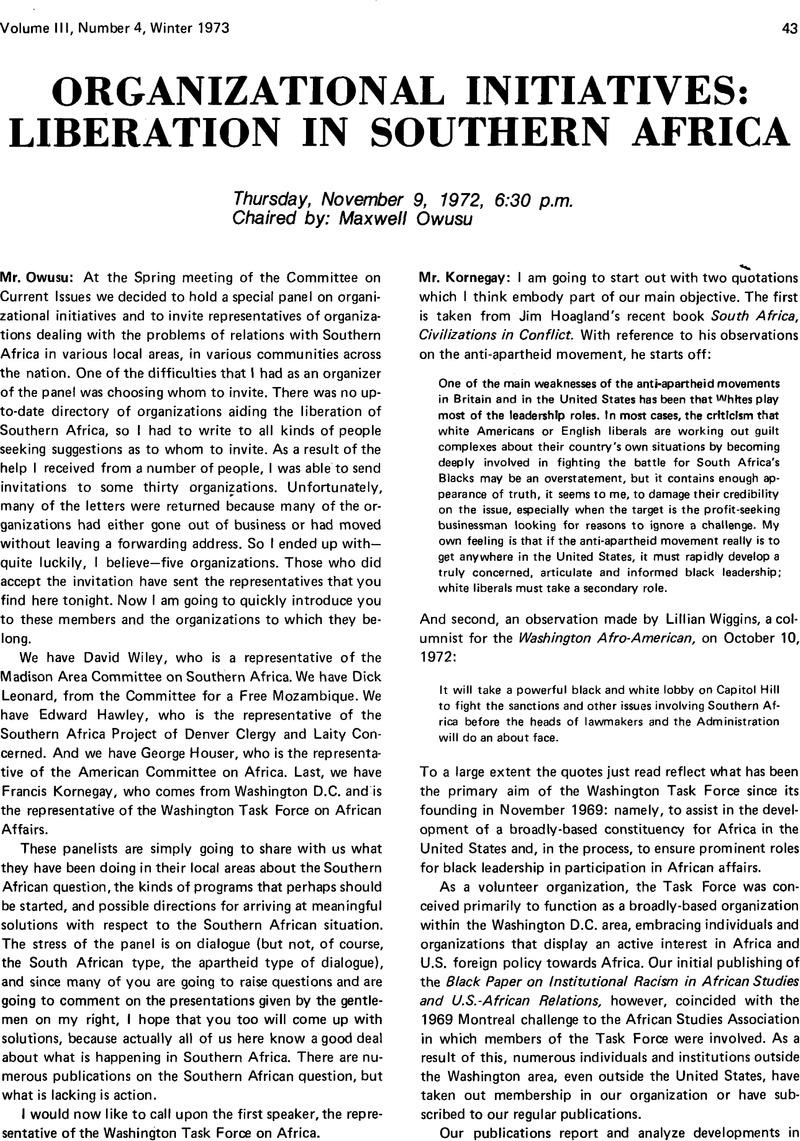No CrossRef data available.
Article contents
Organizational Initiatives: Liberation in Southern Africa
Published online by Cambridge University Press: 23 May 2019
Abstract

- Type
- Other
- Information
- Copyright
- Copyright © African Studies Association 1973
References
Note: Since this presentation on Task Force activities at the 1972 ASA meeting in Philadelphia, the Washington Task Force on African Affairs (WTFAA) has put further stress upon exploiting available electronic mass communications technology for constituency building with important implications for educating public opinion on Southern African issues. From January through May 1973, the Task Force, in conjunction with Michigan State University's African Studies Center, experimented in developing a multi-media approach towards projecting African issues based upon a series of video-taped panel discussions accompanied by background pamphlets published by the African Bibliographic Center on the specific topics discussed. These panels focused on issues such as: “The U.S. Congress & Africa”; “Mass Communications & Africa”; “Southern Africa & U.S. Foreign Policy”; “Impact: U.S. Constituency for Africa”; and “Africa in the World Arena.” The video-tapes from these panels are currently being edited by MSU and will be made available for purchase from the African Bibliographic Center along with published transcripts from each of the panels.
During the Summer and Fall of 1973, the Task Force's interest in the mass communications media for projecting vital African issues shifted to other areas. A t the end of August, members of WFTAA produced a half-hour televised discussion on U.S.-African policy for the local Black United Front's TV talk show "Free Forum" (WMALTV). On this program. Task Force members discussed the implications of Henry Kissinger's appointment as Secretary of State for the future course of U.S.-African relations; whether or not grass-roots concern over the famine and drought in the Sahel could be used to move the United States government to establish positive, longterm policies towards Africa; and the media's treatment of Southern African issues, including criticism of television's almost total lack of coverage of developments in Southern Africa. Finally, the Task Force, in cooperation with the African Bibliographic Center, during October 1973 revived “HABARI” (formerly a newsletter) into the form of an “experimental” telephone information service which will enable those interested in current developments in African affairs to dial and receive taped data on selected and topical developments relating to Africa and/or U.S. relations with Africa, with particular emphasis on activities within Congress or governmental agencies. It is the Task Force's belief that only through the concerted and imaginative use of mass communications media in African affairs will Southern African issues (as well as other vital matters affecting Africa) obtain the adequate projection they need and deserve if they are going to be seriously dealt with by Americans. In the process, such efforts on the media front can serve a vital function in building the type of communication and cooperation among interest groups so vital in constituency building for Africa in this country. Additional information about Task Force activities can be obtained by writing to : WTAFF, P.O. Box 13033, Washington, D.C. 20009. F.K.
page 51 note * Headquarters of the American Committee on Africa (ACOA) are at 164 Madison Avenue, New York, N.Y. 10016. The Washington Office on Africa is located at 110 Maryland Avenue NE, Washington, D.C. 20002.
Some notes on CFM's work since the 1972 African Studies Association meeting: The Committee raised some $4,800 in 1973 towards direct liberation support, making a total of more than $12,000 raised since 1970. Through Project Transister last year, CFM sent transister radios for use in villages in liberated Mozambique.
This year we have started a new special project to raise funds for the Josina Machel Infantario, an orphanage and children's center in Niassa province in Mozambique.
We also have a print of a new film on Mozambique, A Luta Continua, available for rental, the proceeds going to FRELIMO support. The film was made by Robert Van Lierop and Robert Fletcher, two Black American filmmakers, inside liberated Mozambique. A slide show, based on still photos by Mr. Van Lierop from the same trip, is also available now.
Further information can be obtained from: Committee for a Free Mozambique, 616 West 116 St., No. 1A, New York, N.Y. 10027.
page 52 note * Southern Africa is published by the New York Southern Africa Committee (224 West 27 St., 5th Floor, New York, N.Y. 10001). Subscription rates are $5.00 per year for individuals and fifty cents per copy for regular issues.




